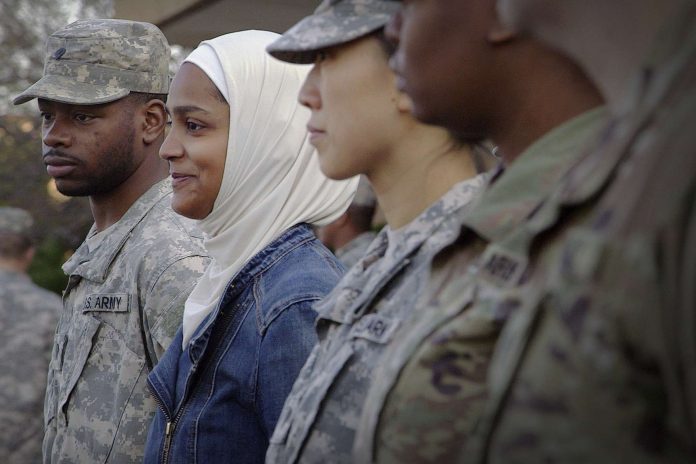
By Mariam Fam
Associated Press
(AP) – The woman refused to sell Captain Saleha Jabeen a hijab to don with her military uniform. While many civilian Muslims tell Jabeen she makes them proud, others are horrified by her decision to serve. “You’re gonna go kill Muslims,” the store owner told her that day.
Major Rafael Lantigua Jr. has experienced the flip side of that struggle. Angered by an attack on U.S. troops in Iraq, a fellow service member once barked at Lantigua: “Why can’t you call your people and tell them to stop?”
The words stung. Just as Jabeen thought the woman saw her as a bad Muslim, Lantigua felt the implication of the outburst directed at him was: You don’t belong. (The service member later apologized).
In the years since, Jabeen and Lantigua have become part of the small group of Muslim military chaplains who tend to the souls and spirits of U.S. troops of all faiths and no faith — their work highlighted in a new film that offers a peek into their worlds. Among other duties, they give talks on suicide prevention, provide counsel on relationships, and advise commanders on matters of religion and morale. When the going gets tough, they offer comfort, hope and companionship.
They sometimes break barriers and celebrate milestones, like Jabeen becoming the first female Muslim military chaplain a few years ago. At other times, they navigate tensions stemming from the views some have of their faith or their service when those get questioned, scrutinized, debated.
“We’re bridge builders,” Lantigua said in an interview. “We’re trying our best in this tension to get like-minded individuals to see the humanity of the other.”
Jabeen and Lantigua are featured in “Three Chaplains,” a documentary that recently aired on PBS and is now available online. (The third is Army Col. Khallid Shabazz). In the film and in interviews, they provide a window into the struggles and victories of Muslim chaplains and service members in one of the most American of institutions.
Lantigua said his familiarity with Islam has helped him maneuver through this “tension” — that fraught space, squeezed between skepticism by some non-Muslims and dismay by some civilian Muslims, especially over U.S. wars in Muslim-majority countries.
The friction, he said, ebbs and flows. It was heightened during such times as 9/11, the wars in Afghanistan and Iraq and the aftermath of a 2009 deadly shooting rampage on a military base in Texas by a Muslim Army psychiatrist.
“These voices from both sides of the aisle start piling on upon Muslim service members,” Lantigua said.
That can be especially hard for new troops, said Lantigua, who’s served for nearly three decades, including deployments in Kuwait, Iraq and Afghanistan. Born to a father from the Dominican Republic and an African American mother, he was raised as a Christian before becoming a Muslim.
Lantigua said he reminds those with concerns over Muslim service members of the First Amendment’s guarantee of religious freedom. Similarly, he tells disapproving Muslims that there are Muslim-majority countries that have been part of military coalitions alongside the United States, that the U.S. military has rules of engagement that service members must abide by and that breaking these rules carries repercussions.
In the film, one retired lieutenant colonel talks about feeling proud wearing her uniform, but becoming disillusioned when reports of inmates’ abuse in the now-infamous Abu Ghraib prison emerged after the U.S-led invasion of Iraq.
“I don’t think I would join the military today … but, at the same time, I am so happy that you’ve answered the call to break that barrier,” Shareda Hosein told Jabeen on camera.
“Three Chaplains” director David Washburn, who has done previous work on Muslims in the military, said he found that the chaplains “occupied a space where all sorts of compelling story lines intersected: religious freedom, Islamophobia, interfaith dialogue, diversity in military today.”
Jabeen, who was born in India, sees the curiosity that comes with her being a Muslim female religious leader. Sometimes, questions follow, over lunch or chats, about the place of women in her faith. She shares stories about her life and strong Muslim women from the Prophet Muhammad’s wife, Khadija, to American Muslim politicians and community leaders today.
With the Israel-Hamas war, Jabeen said she also checked in with a couple of Jewish service members. “We had good conversations about `You know what, it is actually hurting; everybody’s hurting.’”
She had also worked through her own emotions. She happened to be on leave and with a female Christian military chaplain when she learned of the Oct.7 Hamas attack on Israel. They talked, held each other’s hands, and prayed.
















